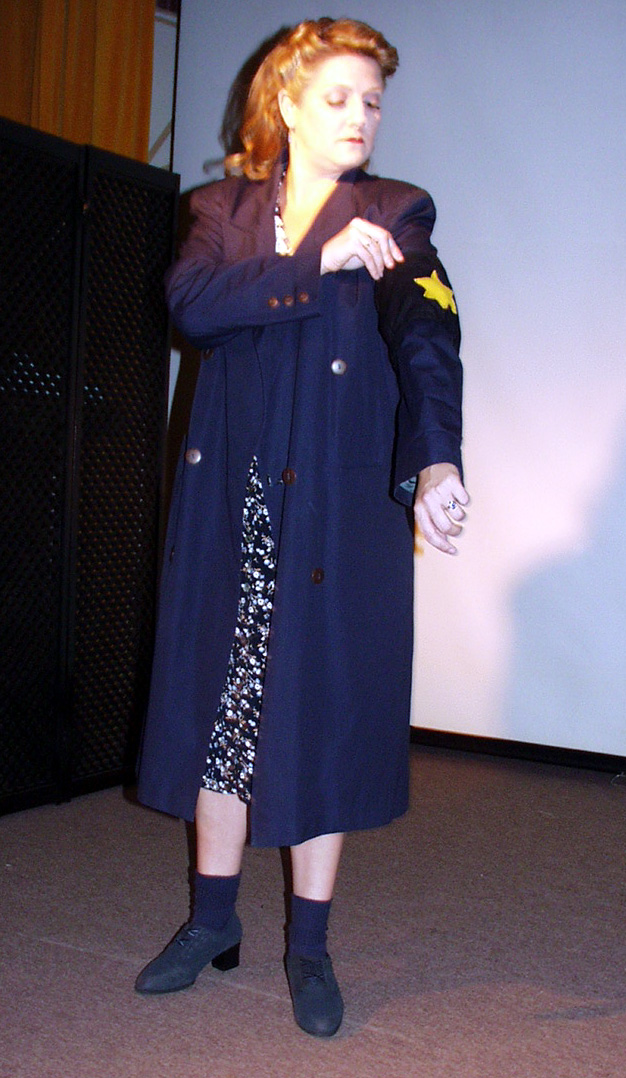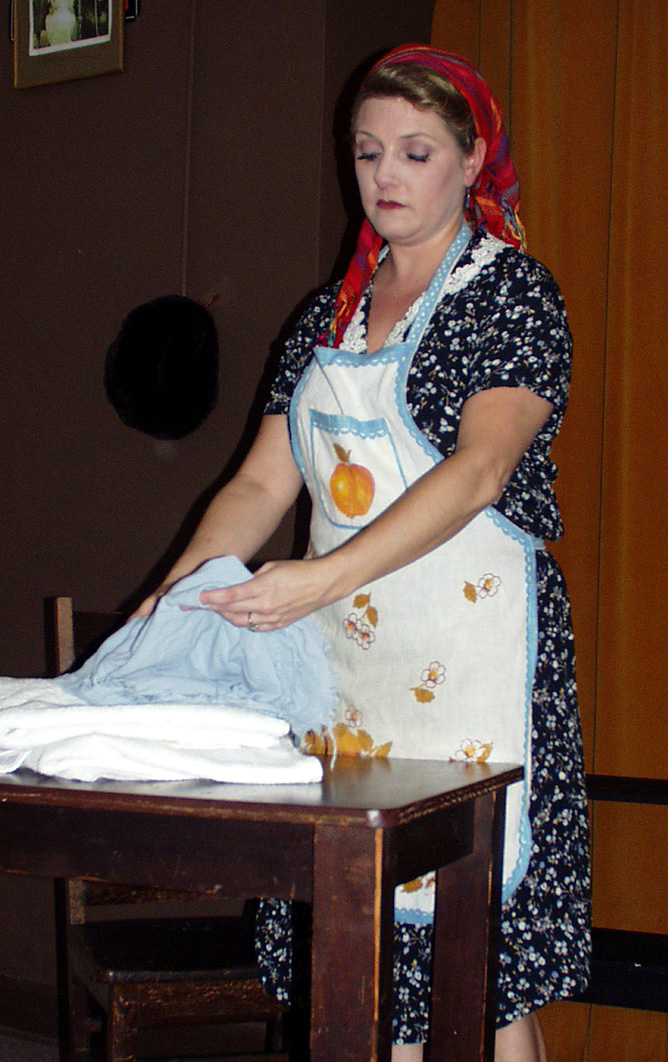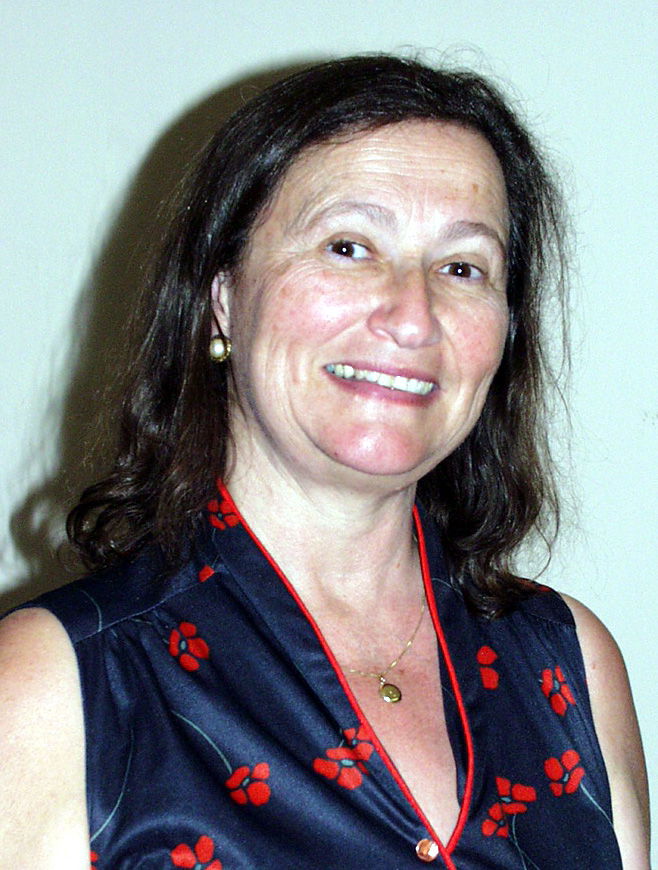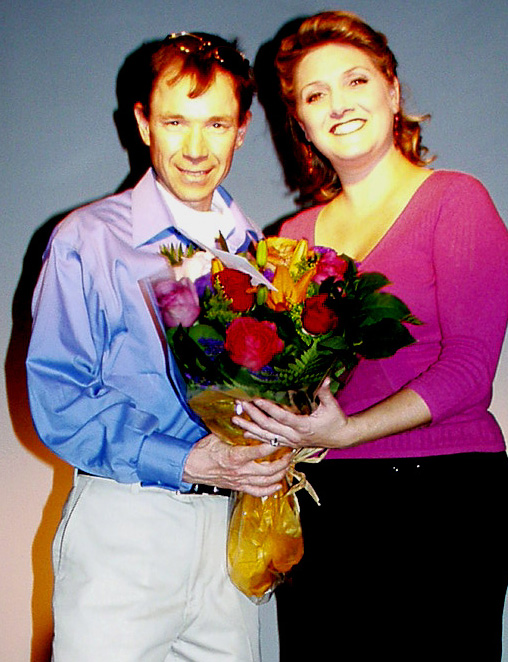|
By Donald H. Harrison
SAN DIEGO, Calif.—Somehow it seemed bashert that when the one-woman
play Renny's Story, which had been previewed on this web site, at last
was produced, it had its world premiere on Saturday, May 6, in the
Swedenborgian Church in San Diego. Sweden was one of the few European countries
permitted to remain neutral during World War II, and as a result, it was a place
to which Jews could escape—as many from Nazi-occupied Denmark did.
  Renny's
Story is premised on the idea that escape, perhaps by concealment, might
have been possible for the two-year-old son of Renny Grynblatt Trajman
Kurshenbaum, from whom she was separated in Poland. Renny, today an
octogenarian, had managed to elude death by posing as a Christian farm girl, so
perhaps, somehow, whoever took her son for safekeeping might also have escaped
the Nazis. Renny's
Story is premised on the idea that escape, perhaps by concealment, might
have been possible for the two-year-old son of Renny Grynblatt Trajman
Kurshenbaum, from whom she was separated in Poland. Renny, today an
octogenarian, had managed to elude death by posing as a Christian farm girl, so
perhaps, somehow, whoever took her son for safekeeping might also have escaped
the Nazis.
Little Josef, who was given the Polish name Jurek, would be over 60 years old
today, but Renny, too ill to travel from Chicago, hopes that if he is still
alive, that she might yet be reunited with him. Everyone knows Renny's hope is a
long shot at best, but her son, Dr. Howard Kurshenbaum of San Diego decided to
commission a play based on his mother's story with the idea of showing
videotaped snippets from it on her website, www.rennysstory.com.
  So
playwright Janet Tiger wrote the drama, juxtaposing Renny's Holocaust
testimony with some humorous folk tales about the silly legendary people of
Helm, thereby providing a new perspective on the absurdity of both the Helmites
and the Holocaust. So
playwright Janet Tiger wrote the drama, juxtaposing Renny's Holocaust
testimony with some humorous folk tales about the silly legendary people of
Helm, thereby providing a new perspective on the absurdity of both the Helmites
and the Holocaust.
Diane Shea directed the hour-long play and actress Kimberly Kaplan gave a moving
performance as the first on-stage Renny, which, though occasionally slow-paced,
moved the audience both emotionally and
Diane Shea
Janet Tiger
physically. At one point, audience members followed her directions
to change seats, an illustration of how people have a tendency to comply with
orders or requests, even when no guns are pointed at them.
Having read the script previously, I wondered how it would be brought to life on
stage. Kaplan, a talented actress who had modeled her Polish accent on
Meryl Streep's performance in Sophie's Choice, worked with simple, but
effective, props designed by director Shea. She wore a blue overcoat
with the yellow Jewish star on it when reliving her experiences in the Warsaw
Ghetto; and an apron and babuskha in her assumed identity as a Polish
farm girl working as a domestic. The rest of the time, she wore a flower
print dress with a lace collar.
 The
audience in 100 folding chairs in the Swedenborgian Church were appreciative of
this labor of love and of hope, which potentially could have more far-reaching
consequences than one family's possible reunification. The monologue tells
the story of how people who were able to stay out of the concentration camps
survived, and provides us with a sense of how their constant fear of discovery
played havoc with their emotions. But it also gave us some idea of
the resoluteness with which European Jewry tried to stay alive. The
audience in 100 folding chairs in the Swedenborgian Church were appreciative of
this labor of love and of hope, which potentially could have more far-reaching
consequences than one family's possible reunification. The monologue tells
the story of how people who were able to stay out of the concentration camps
survived, and provides us with a sense of how their constant fear of discovery
played havoc with their emotions. But it also gave us some idea of
the resoluteness with which European Jewry tried to stay alive.
 With
fewer and fewer survivors around each passing year to tell their personal
stories, future generations will have to rely on stage productions as this to
encounter survivors one-on-one. Kurshenbaum presented Kaplan with a
bouquet of flowers in appreciation of her performance, but he too deserves kudos
for financing this project. With
fewer and fewer survivors around each passing year to tell their personal
stories, future generations will have to rely on stage productions as this to
encounter survivors one-on-one. Kurshenbaum presented Kaplan with a
bouquet of flowers in appreciation of her performance, but he too deserves kudos
for financing this project.
There were just two performances of this play today—one in the afternoon and
one in the evening—but the chances are good that other audiences in the future
will see it. No matter what has happened to Joseph/ Jurek, through this
medium, not only Renny's Story, but his, will live on.
|

